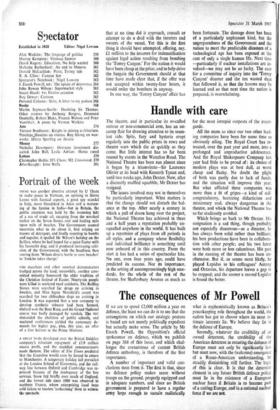Handle with care
The theatre, and in particular its so-called serious or non-commercial arm, has an un- canny flair for drawing attention to its seam- iest side. Spite, fury and hysteria erupt regularly into the public prints in rows and theatre wars which die as quickly as they come. But little interest has so far been roused by events in the Waterloo Road. The National Theatre has been run almost since it began by a triumvirate—Sir Laurence Olivier at its head with Kenneth Tynan and, until two weeks ago, John Dexter. Now, after a discreetly muffled squabble, Mr Dexter has resigned.
The issues involved may not in themselves be particularly important. What matters is that the change should not disturb the bal- ance at the top. After nearly a century in which a pall of doom hung over the project, the National Theatre has achieved in three and a half years a reputation probably un- equalled anywhere in the world. It has built up a repertoire of plays from all periods in all styles, and a company whose flexibility and individual brilliance is something until now unheard of in this country. From the start it has had a series of spectacular hits. No one, even four years ago, could have predicted its success. Nor its importance, in the setting of uncompromisingly high stan- dards, for the Whole of the rest of the theatre, for Shaftesbury Avenue as much as for the most intrepid outposts of the avant- garde.
All the more so since our two other lead- ing companies have been for some time so obviously ailing. The Royal Court has re- treated, over the past year and more, into a prolonged and unproductive adolescence. And the Royal Shakespeare Company last year had little to be proud of: its choice of modern plays was at best dull, at worst cheap and flashy. No doubt the plight of both was partly due to lack of funds, and the situation will improve this year. But what afflicted these companies was more than a fit of gripes—a kind of self- congratulatory, hectoring didacticism and missionary zeal, always dangerous in the theatre, and which the National Theatre has so far studiously avoided.
Which brings us back to Mr Dexter. His resignation is a sad thing, though probably not especially disastrous—as a director, be has always been solid rather than brilliant; his best productions have been in collabora- tion with other people; and his two latest were both more or less calamitous. His part in the running of the theatre has been un- obtrusive. But if, as seems most likely, lie played Lepidus to his colleagues' Antony and Octavius, his departure leaves a gap to be stopped; and the sooner a second Lepidus is found the better.






























 Previous page
Previous page